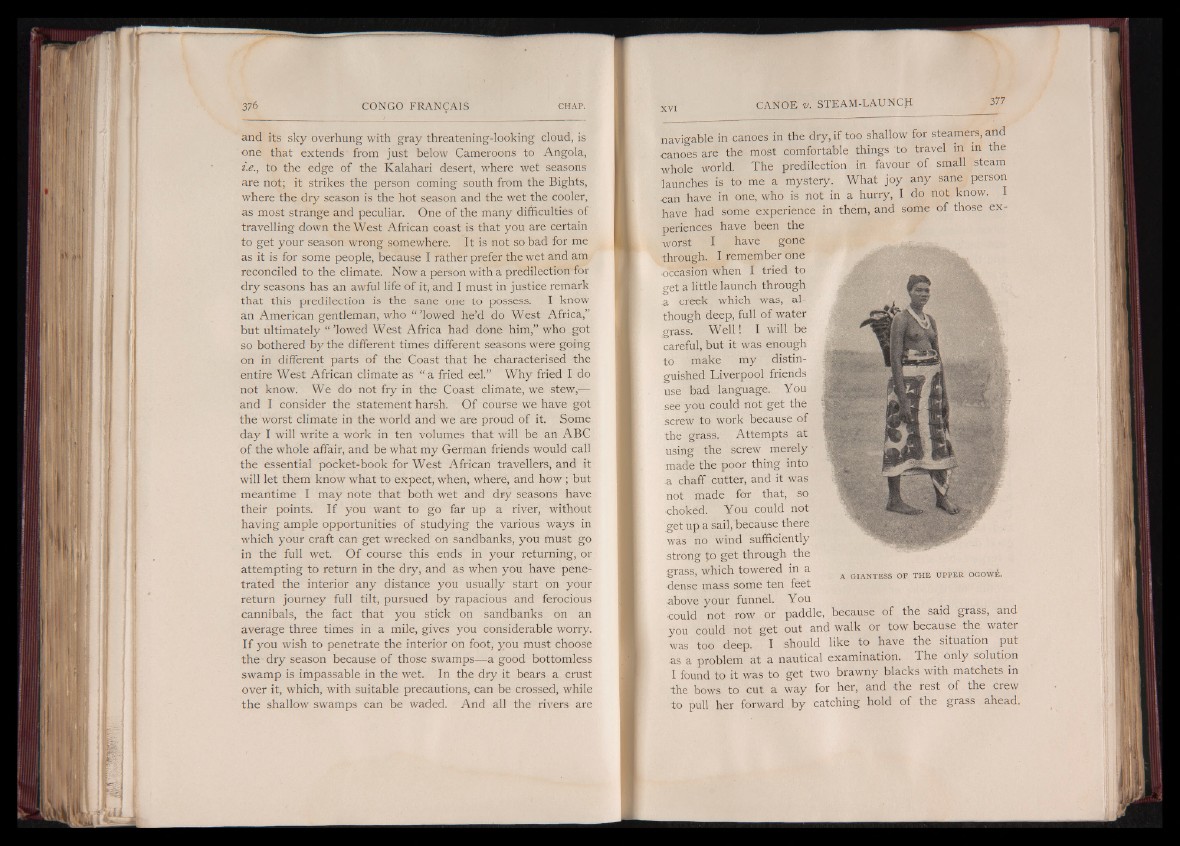
and its sky overhung with gray threatening-looking cloud, is
one that extends from just below Cameroons to Angola,
i.e., to the edge of the Kalahari desert, where wet seasons
are not; it strikes the person coming south from the Bights,
where the dry season is the hot season and the wet the cooler,
as most strange and peculiar. One of the many difficulties of
travelling down the West African coast is that you are certain
to get your season wrong somewhere. It is not so bad for me
as it is for some people, because I rather prefer the wet and am
reconciled to the climate. Now a person with a predilection for
dry seasons has an awful life of it, and I must in justice remark
that this predilection is the sane one to possess. I know
an American gentleman, who “ ’lowed he’d do West Africa,”
but ultimately “ ’lowed West Africa had done him,” who got
so bothered by the different times different seasons were going
on in different parts of the Coast that he characterised the
entire West African climate as “ a fried eel.” Why fried I do
not know. We do not fry in the Coast climate, we stew,—
and I consider the statement harsh. Of course we have got
the worst climate in the world and we are proud of it. Some
day I will write a work in ten volumes that will be an ABC
of the whole affair, and be what my German friends would call
the essential pocket-book for West African travellers, and it
will let them know what to expect, when, where, and how ; but
meantime I may note that both wet and dry seasons have
their points. If you want to go far up a river, without
having ample opportunities of studying the various ways in
which your craft can get wrecked on sandbanks, you must go
in thé full wet. Of course this ends in your returning, or
attempting to return in the dry, and as when you have penetrated
the interior any distance you usually start on your
return journey full tilt, pursued by rapacious and ferocious
cannibals, the fact that you stick on sandbanks on an
average three times in a mile, gives you considerable worry.
I f you wish to penetrate the interior on foot, you must choose
the dry season because of those swamps— a good bottomless
swamp is impassable in the wet. In the dry it bears a crust
over it, which, with suitable precautions, can be crossed, while
the shallow swamps can be waded. And all the rivers are
navigable in canoes in the dry, if too shallow for steamers, and
canoes are the most comfortable things to travel in in the
whole world. The predilection in favour of small steam
launches is to me a mystery. What joy any sane person
can have in one, who is not in a hurry, I do not know. I
have had some experience in them, and some of those e x periences
have been the
worst I have gone
through. I remember one
occasion when I tried to
get a little launch through
a creek which was, although
deep, full of water
grass. W e ll! I will be
careful, but it was enough
to make my distinguished
Liverpool friends
use bad language. You
see you could not get the
screw to work because of
the grass. Attempts at
using the screw merely
made the poor thing into
a chaff cutter, and it was
not made for that, so
■choked. You could not
get up a sail, because there
was no wind sufficiently
strong Jo get through the
grass, which towered in a ^ GIANTESS 0F t h e u p p e r o g o w e .
•dense mass some ten feet
above your funnel. You
could not row or paddle, because of the said grass, and
you could not get out and walk or tow because the water
was too deep. I should like to have the situation put
as a problem at a nautical examination. The only solutipn
I found to it was to get two brawny blacks with matchets in
the bows to cut a way for her, and -the rest of the crew
to pull her forward by catching hold of the grass ahead.